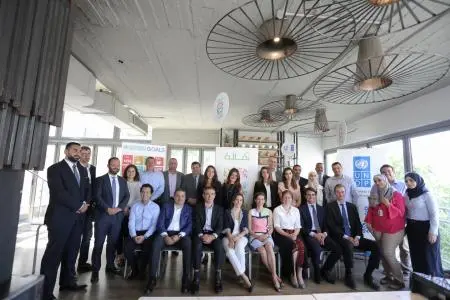PHOTO
Amman, Jordan: UNDP Jordan announced yesterday a new partnership with Unilever to implement the ‘Baqala Program’ and create long-term employment opportunities for both Jordanians and Syrians through skills development and on the job training.
Developed in partnership with Unilever - owner of global brands such as Knorr, Lipton, Dove, Lifebuoy - the Baqala Program will develop selling and merchandising skills through a 3-month on-the-job training and internship provided by Unilever. The vocational training program Baqala will take place within the governorates of Irbid and Zarqa targeting young Jordanians and Syrian refugees.
“Through this partnership we are looking to support SDGs and Agenda 2030 in Jordan, a step that is highly appreciated by UNDP,” UNDP Jordan Country Director Sara Ferrer Olivella commented during the signing ceremony held at UNDP’s offices in Amman on July 2nd.
“Economic development is central to the long-term success of businesses and implementing the Baqala Program will create job opportunities and generate rising incomes and thus new market opportunities”, Olivella concluded.
Sanjiv Kakkar, Executive Vice President for Unilever MENA, Turkey, Russia, Ukraine and Belarus said:
“Our business contributes to the economic livelihoods of many people and communities across our value chain. Through skills development, increased access to markets and employment, we believe we can help people unlock their potential - so they can support themselves, their communities and our business.”
“The Baqala Program and our partnership with UNDP will support building resilience among vulnerable communities in Jordan while driving economic value.”
In line with Unilever Sustainable Living Plan (USLP) and its ambition of enhancing livelihoods of millions, the Baqala Program was first developed by Unilever with the aim of building the capabilities of small grocery owners to run their business in a sustainable and profitable manner and successfully executed in Oman. In 2017, the program was reintroduced with the goal of creating positive social impact through developing merchandising and sales skills of unemployed young people and refugees by providing on-the-job training and internship. UNDP will identify the young beneficiaries, as well as the potential small grocery owners that would benefit from Unilever’s retail management business training. UNDP will manage the selection process, while the trainings will be provided by Unilever.
UNDP and Unilever envision scaling up the Baqala Program by enhancing access to long-term employment opportunities and targeting more vulnerable Jordanians and refugees in different areas in Jordan.
-Ends-
About UNDP:
UNDP partners with people at all levels of society to help build nations that can withstand crisis, and drive and sustain the kind of growth that improves the quality of life for everyone. On the ground in more than 170 countries and territories, we offer global perspective and local insight to help empower lives and build resilient nations.
About Unilever:
Unilever is one of the world’s leading suppliers of Beauty & Personal Care, Home Care, and Food & Refreshment products with sales in over 190 countries and reaching 2.5 billion consumers a day. It has 161,000 employees and generated sales of €53.7 billion in 2017. Over half (57%) of the company’s footprint is in developing and emerging markets. Unilever has more than 400 brands found in homes all over the world, including Persil, Dove, Knorr, Domestos, Hellmann’s, Lipton, Wall’s, PG Tips, Ben & Jerry’s, Magnum and Lynx.
Unilever’s Sustainable Living Plan underpins the company’s strategy and commits to:
- Helping more than a billion people take action to improve their health and well-being by 2020.
- Halving the environmental impact of our products by 2030.
- Enhancing the livelihoods of millions of people by 2020. The USLP creates value by driving growth and trust, eliminating costs and reducing risks. The company’s sustainable living brands are growing 50% faster than the rest of the business and delivered more than 60% of the company’s growth in 2016.
Unilever was ranked number one in its sector in the 2017 Dow Jones Sustainability Index. In the FTSE4Good Index, it achieved the highest environmental score of 5. It led the list of Global Corporate Sustainability Leaders in the 2017 GlobeScan/SustainAbility annual survey for the seventh year running, and achieved four A ratings across Climate Change, Water, Forests and Supplier Engagement in CDP's 2018 Global Supply Chain report. Unilever has pledged to become carbon positive in its operations by 2030, and to ensure 100% of its plastic packaging is fully reusable, recyclable or compostable by 2025. For more information about Unilever and its brands, please visit www.unilever.com. For more information on the USLP: www.unilever.com/sustainable-living/
© Press Release 2018Disclaimer: The contents of this press release was provided from an external third party provider. This website is not responsible for, and does not control, such external content. This content is provided on an “as is” and “as available” basis and has not been edited in any way. Neither this website nor our affiliates guarantee the accuracy of or endorse the views or opinions expressed in this press release.
The press release is provided for informational purposes only. The content does not provide tax, legal or investment advice or opinion regarding the suitability, value or profitability of any particular security, portfolio or investment strategy. Neither this website nor our affiliates shall be liable for any errors or inaccuracies in the content, or for any actions taken by you in reliance thereon. You expressly agree that your use of the information within this article is at your sole risk.
To the fullest extent permitted by applicable law, this website, its parent company, its subsidiaries, its affiliates and the respective shareholders, directors, officers, employees, agents, advertisers, content providers and licensors will not be liable (jointly or severally) to you for any direct, indirect, consequential, special, incidental, punitive or exemplary damages, including without limitation, lost profits, lost savings and lost revenues, whether in negligence, tort, contract or any other theory of liability, even if the parties have been advised of the possibility or could have foreseen any such damages.




















